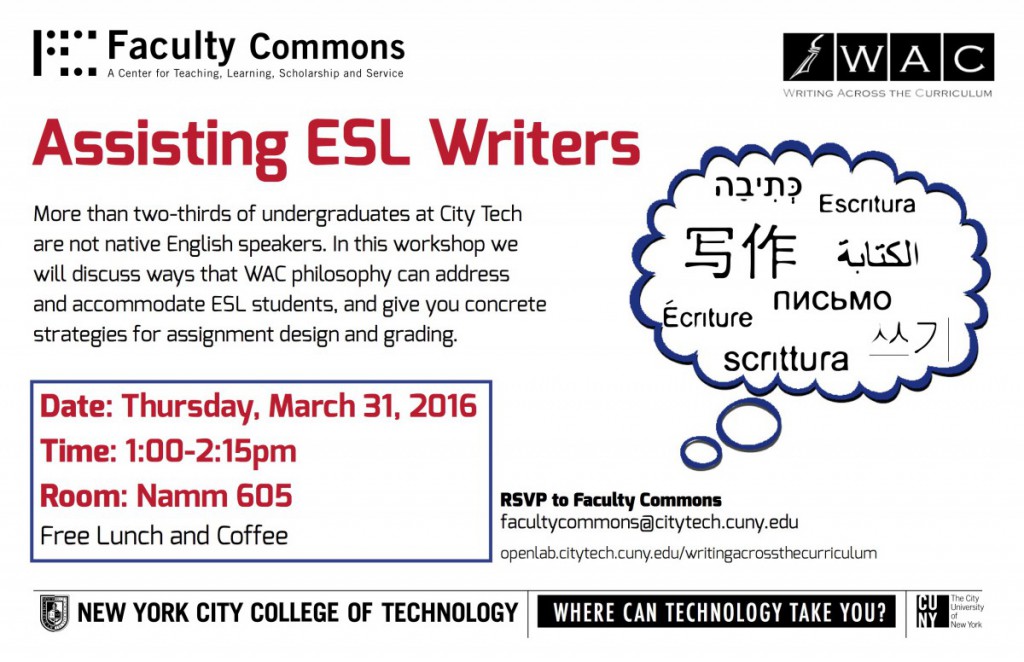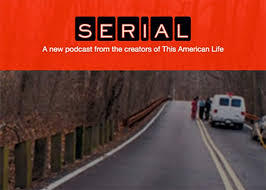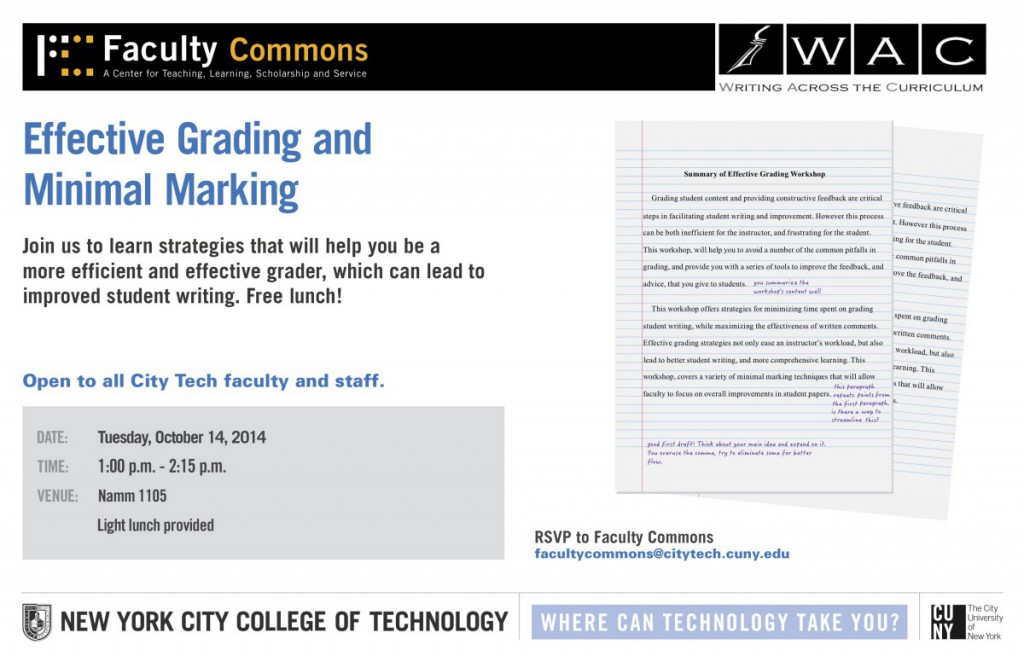Our semester rolls on as we held the third of four faculty professional development workshops dealing with Writing Across the Curriculum (WAC) teaching and planning strategies. If you missed our workshop last Thursday on Effective Grading and Minimal Marking, read our recap below to learn about strategies that not only can save you time in the grading process, but will help to produce better student work. Follow along with the PowerPoint and Handout.
WAC fellows Pamela Thielman, Drew Fleming, and Emily Crandall led an informative and diverse workshop that covered many aspects of the grading process, from planning assignments and grading structures in advance to how to reduce the sometimes-daunting paper load once those assignments have been turned in.
Emily began by outlining that the most effective grading requires two steps: 1) planning before the assignment is given, and 2) practicing efficient marking techniques once the papers come in. We identified a variety of kinds of “higher-order” concerns (those dealing with content, organization, argument, evidence, and other “big picture” issues) and “lower-order” concerns (those dealing with spelling, grammar, citation style, sentence structure, word choice), and noted how students will respond to whatever we as instructors mark on their paper. So, if we mark twenty lower-order issues on a page but only one higher-order issue such as organization or argument, it’s likely that students will only focus on those grammatical issues in revision, rather than the oftentimes more important problem of organization.
Emily then discussed how laying a good foundation before the papers come in can be beneficial to the instructor after the papers come in and it’s time to grade. Scaffolding an assignment into its constituent parts and other good assignment design practices are crucial at this step, as is transparency in the grading criteria. By letting students know what we’re grading for (either by using a rubric or by having class discussions about expectations), we can expect better results.
Drew then built on Emily’s points by going into detail about how scaffolding an assignment into smaller parts can ensure that you are spreading out the grading workload over the course of the semester. You can also address student issues earlier in the process as you catch them, so that the final product has already gone through a number of revision steps and is therefore a more polished paper (and therefore easier to grade!).
Peer review is another useful tool to alleviate the grading load, because you are “outsourcing” some of the assessment process onto the students. We included a number of peer review templates in the handout for this workshop, which as Drew pointed out are crucial to a successful peer review, giving the students structure and specific criteria for which to grade.
Finally, to help remember what it’s like for our students to receive a paper filled with tons of red ink corrections, we watched a short video made by students at Bunker Hill Community College in Boston, MA, that really hits home the effect that our grading can have on our students. Even though we are often trying to be helpful, we forget that students often take our markings as negative criticism, and that it discourages them from wanting to revise and do better. Faculty in attendance seemed to get a lot from this video that reminds us of the power we have when we grade.
https://www.youtube.com/watch?v=XluNo599LMY
In this respect, we’re reminded that our role as instructors when grading a paper is not just to evaluate the students, which is the traditional role of grading, but also to communicate with our students and to motivate them. We should think of ourselves more as a coach than a judge, since the goal of writing a paper should not only be for students to convey what they have learned, but to improve their writing and organizational skills over the course of the semester. As their writing improves, so too does their mastery of course material, and so we should remember to take an active role in helping that progression.
Finally, Pamela covered a variety of specific strategies for minimal marking, a process that seeks to reduce the overall amount of marking on students’ work while increasing the potency of specific comments and annotations. In other words, write more less often. She stressed that as instructors, we shouldn’t feel the need to necessarily have to do all of these minimal marking techniques, but to pick and choose as suits the assignment and your style.
For low-stakes assignments, Pamela recommended either no grade or check grading. As we’ve covered in previous workshops, simply getting students to write helps them in the learning process, and so we don’t need to grade everything we assign. She recommended also putting the pen down on your first read through a student’s paper. This way, rather than feeling the need to mark every misplaced comma or subject/verb disagreement, you can concentrate on bigger picture issues. Then, at the end, we can comment on global patterns of error in lower-order concerns.
We also discussed selective line edits, for those instructors who want to make sure that they are pointing out specific lower-order problems. Rather than covering an entire paper in markings and corrections, consider only doing one paragraph, or one page. This way, the student sees their mistakes but is not overwhelmed by them, and the onus of correcting falls on them. Frequently, when we mark a student’s paper up completely, the student will only make the corrections that we suggest! This encourages the student to take it upon themselves to identify their errors.
Finally, as Pamela noted in her blog post last week, use any color pen except red!
Above all, we stressed supportive responding that not only assesses the student’s work, but motivates them towards revision and communicates new ideas or questions to them. Asking questions in margins or end comments is a great way to both communicate and motivate students further without “giving them the answer.”
Join us for our last workshop of the semester, “The Creative Classroom” on December 10, 2015, in Namm 1005. WAC Fellows Emily Crandall and Julie Hollar will cover ways to incorporate non-traditional and technological assignments and activities into the classroom that combine with writing assignments to make class time dynamic, varied, and fun.











